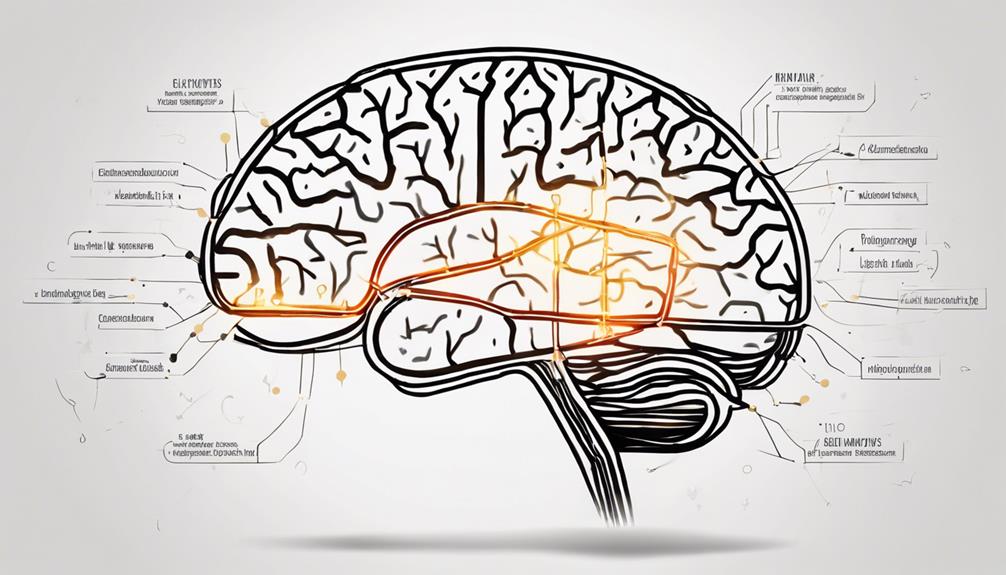Sleep, a fundamental physiological process, is a topic of great scientific interest due to its multifaceted impact on human health and functioning. The question of why we need sleep delves into intricate mechanisms that govern our daily lives and well-being. From cognitive performance to immune function, the reasons behind our need for sleep are deeply rooted in the intricate workings of our bodies. Let's explore the fascinating world of sleep and unravel the mysteries that lie within this essential aspect of human existence.
Key Takeaways
- Sleep is essential for cognitive function, memory consolidation, and overall well-being.
- Quality sleep supports immune system function, tissue repair, and chronic disease prevention.
- Proper sleep enhances cognitive performance, emotional balance, and metabolic health.
- Prioritizing sleep is vital for brain processes, hormonal regulation, and immune system support.
Importance of Sleep

Sleep plays a fundamental role in maintaining optimal cognitive function and overall well-being. Adequate sleep is essential for various aspects of health, including mental health, immune system function, and reducing the risk of chronic diseases. Quality sleep allows the brain to engage in crucial processes such as memory consolidation, learning, and emotional regulation. During sleep, the brain clears out toxins that accumulate during waking hours, consolidates memories, and repairs tissues. This restoration process is vital for brain health and overall well-being.
Furthermore, sufficient sleep supports the immune system, helping the body defend against illnesses and maintain overall health. Chronic lack of sleep has been linked to impaired decision-making, mood disturbances, and an increased susceptibility to chronic diseases. Therefore, prioritizing quality sleep is not only important for cognitive function and mental health but also for supporting physical health and reducing the risk of various health issues.
Sleep and Brain Function
Sleep plays a critical role in brain health as it facilitates the consolidation of memories and the removal of waste products, optimizing cognitive function. Additionally, adequate sleep enhances cognitive performance, leading to improved problem-solving abilities, decision-making skills, and attention span. Understanding the intricate relationship between sleep and brain function is essential for maintaining overall cognitive wellness and emotional regulation.
Brain Health During Sleep
During the restorative process of sleep, the brain undergoes crucial functions that optimize neural health and cognitive performance.
- Sleep promotes brain health by supporting neuronal repair and growth.
- The glymphatic system clears waste products from the brain during deep sleep, enhancing brain function.
- Neural plasticity during sleep allows the brain to reorganize and form new connections, essential for cognitive functions.
- Memory consolidation occurs during sleep, where the brain processes information from the day for long-term storage.
These processes are vital for overall brain health, cognitive functions, and memory retention. Sleep plays a fundamental role in maintaining optimal brain function, supporting cognitive processes, and ensuring neural well-being.
Memory Consolidation Process
The consolidation of memories during the restorative process of sleep is a fundamental aspect of brain function and cognitive performance. Sleep, particularly Rapid Eye Movement (REM) sleep, plays a crucial role in memory consolidation, aiding in learning and enhancing cognitive functions. During sleep, neural connections are strengthened and reorganized, contributing to improved memory recall and problem-solving abilities. Lack of quality sleep can impair the memory consolidation process, leading to difficulties in learning and retaining new information. Therefore, ensuring adequate and quality sleep is essential for optimal cognitive performance and memory retention.REM sleep, cognitive functions, neural connections, learning, problem-solving, and the detrimental effects of lack of sleep are all interconnected in the intricate process of memory consolidation during sleep.
Cognitive Performance Improvement
The process of memory consolidation during sleep serves as a foundational mechanism for enhancing cognitive performance and overall brain function. Quality sleep plays a vital role in optimizing brain function, creativity, and mental acuity. Here are some key points to consider:
- Adequate sleep boosts attention, focus, and decision-making skills.
- During sleep, the brain processes information, forms connections, and enhances problem-solving abilities.
- Lack of sleep hinders cognitive functions, leading to decreased productivity and performance.
- Sleep is crucial for cognitive performance improvement, including memory consolidation and learning.
Ensuring sufficient and quality sleep is essential for maximizing cognitive functions and productivity in daily tasks.
Physical Benefits of Sleep
Sleep plays a vital role in facilitating the repair and restoration of cells, tissues, and muscles within the body. This essential process is crucial for various aspects of physical health, including the regulation of heart rate and blood pressure, the release of the hormone melatonin which aids in maintaining the body's natural sleep-wake cycle, supporting growth and development, boosting immune function, maintaining cardiovascular health, regulating metabolism, and overall optimal body functioning. To highlight the importance of these physical benefits of sleep, the following table showcases the key aspects influenced by quality sleep:
| Physical Benefits of Sleep |
|---|
| Regulation of heart rate and blood pressure |
| Release of the hormone melatonin |
| Support for growth and development |
| Boost to immune function |
| Maintenance of cardiovascular health |
Quality sleep is fundamental for individuals to thrive physically and maintain overall well-being. Prioritizing sufficient and restful sleep is essential for the body to function optimally and support long-term health.
Sleep and Emotional Well-being

Quality sleep is essential for maintaining emotional stability and regulating mood. Adequate rest enables the brain to process emotions effectively and cope with stressors. Sleep deprivation can lead to heightened emotional reactivity and impair the brain's ability to regulate emotions, impacting mental health.
Sleep and Mood Regulation
Adequate sleep is pivotal for nurturing a stable emotional state and fostering optimal mood regulation. Quality sleep directly impacts emotional well-being through various mechanisms:
- Emotional Resilience: Sufficient sleep enhances the ability to cope with stressors and maintain emotional balance.
- Emotional Regulation: Sleep plays a critical role in regulating emotions, preventing heightened reactivity, and promoting stability.
- Mood Stability: Consistent, quality sleep is essential for maintaining a positive outlook and stable mood patterns.
- Insufficient Sleep Effects: Lack of sleep can lead to increased irritability, heightened anxiety, and decreased emotional regulation abilities.
Understanding the intricate relationship between sleep and emotional health underscores the importance of prioritizing quality sleep for overall well-being.
Sleep and Stress
The relationship between sufficient rest and effective emotional regulation is a fundamental aspect of maintaining overall well-being and resilience against stressors. Quality sleep plays a crucial role in managing stress, promoting emotional balance, and enhancing cognitive function. Here is a table summarizing the key points related to sleep, stress management, and emotional well-being:
| Aspect | Importance | Effects |
|---|---|---|
| Quality Sleep | Vital for stress management and emotional balance | Enhances cognitive function and emotional well-being |
| Managing Stress | Facilitates coping with daily challenges | Reduces emotional reactivity and irritability |
| Emotional Balance | Essential for resilience and mental health | Aids in effective stress management |
Prioritizing adequate rest is paramount for nurturing emotional health and mitigating the detrimental impact of stress on mental and physical well-being.
Sleep and Mental Health
An essential correlation exists between sleep patterns and mental health, specifically focusing on emotional well-being and cognitive function.
- Adequate sleep increases brain activity in emotion-regulating areas, promoting emotional stability and well-being.
- Sleep deprivation can lead to overreactions in the amygdala, impacting emotional responses and mental health.
- Proper sleep supports adaptive amygdala responses, aiding in emotional regulation and stress management.
- Sleep disturbances can contribute to mental health issues like anxiety, depression, and mood disorders.
Understanding the relationship between sleep and mental health highlights the significance of quality sleep for emotional well-being and psychological resilience. Prioritizing healthy sleep patterns is crucial for maintaining emotional stability, managing stress, and fostering overall mental health.
Sleep and Memory Consolidation

During the intricate process of sleep, memories undergo a crucial phase known as memory consolidation, where information is processed and fortified for long-term retention. REM sleep, characterized by rapid eye movements, plays a significant role in consolidating emotional and procedural memories. On the other hand, non-REM sleep, particularly slow-wave sleep, is essential for strengthening declarative memories such as facts and events. It is during these sleep stages that the brain facilitates the transfer of information from short-term memory to long-term memory storage, aiding in the enhancement of learning and cognitive functions.
Research indicates that the lack of quality sleep can impede memory consolidation, leading to difficulties in learning and cognitive processes. Therefore, ensuring adequate and restful sleep is crucial for optimal memory function. By understanding the relationship between sleep and memory consolidation, individuals can appreciate the importance of a good night's rest in supporting overall cognitive abilities and information retention.
Sleep and Hormonal Regulation
The regulation of hormones during sleep plays a critical role in various physiological processes. Hormones, such as ghrelin and leptin, are key players in appetite regulation and metabolism. Understanding how hormonal levels fluctuate during sleep can shed light on the impact of sleep quality on overall health and stress hormone levels.
Hormones and Sleep Quality
Hormonal regulation plays a pivotal role in determining the quality of sleep an individual experiences, with key hormones such as melatonin and cortisol intricately involved in the sleep-wake cycle.
- Melatonin production is influenced by circadian rhythms, helping to signal the body for sleep.
- Cortisol levels typically decrease at night to promote relaxation and prepare the body for sleep.
- Hormonal balance is crucial for maintaining a healthy sleep-wake cycle and overall sleep quality.
- Disruptions in hormonal regulation can lead to sleep disturbances and affect the quality of sleep experienced.
Impact on Metabolism
Regulation of sleep and its impact on metabolism intertwine intricately through the modulation of key hunger hormones, emphasizing the critical link between quality sleep and metabolic health. Sleep duration significantly influences weight management by affecting hormonal regulation, particularly in appetite control. During sleep, ghrelin levels decrease, which helps in suppressing hunger, while insufficient sleep leads to elevated ghrelin and reduced leptin levels, resulting in increased appetite. Chronic sleep deprivation disrupts this delicate balance, contributing to a higher risk of obesity. Understanding the relationship between sleep, hormonal regulation, and metabolism underscores the importance of prioritizing adequate and quality sleep for overall metabolic well-being. Proper sleep hygiene is vital in maintaining a healthy weight and reducing the risk of metabolic disorders.
Stress Hormone Levels
Sleep plays a crucial role in modulating stress hormone levels, allowing for the regulation of cortisol during periods of rest. Adequate sleep promotes hormonal balance, reducing the body's stress response. Lack of sleep can lead to elevated cortisol levels, increasing stress and anxiety. Chronic sleep deprivation disrupts hormonal regulation, impacting overall well-being. Quality sleep is essential for maintaining healthy stress hormone levels and managing stress effectively. Proper sleep patterns facilitate the body in regulating heart rate, blood pressure, and other physiological processes related to stress hormone secretion. Prioritizing quality sleep is fundamental in supporting the body's ability to cope with daily stressors and maintain overall health.
Repair and Restoration During Sleep
During the restorative phase of sleep, the body undergoes vital processes that contribute to the repair and rejuvenation of tissues, muscles, and cells essential for overall health and well-being. Sleep is a critical time for the release of growth hormones that aid in repairing and rebuilding damaged tissues, promoting physical recovery. Moreover, neural connections in the brain are strengthened and consolidated during sleep, enhancing memory consolidation and cognitive function. This strengthening of neural connections is essential for learning, problem-solving, and overall brain health. Additionally, sleep plays a crucial role in the clearance of waste products from brain cells, which is vital for promoting optimal brain function and mental clarity. Adequate sleep is indispensable for the body to recover from daily activities, regenerate energy, and maintain optimal physical and mental health. Thus, the repair and restoration processes that occur during sleep are fundamental for overall well-being and vitality.
Immune System Support From Sleep

The restorative phase of sleep is pivotal for supporting the immune system through the release of essential cytokines that aid in combating infections and inflammation. Adequate and quality sleep plays a crucial role in maintaining a robust immune response. Here are some key points highlighting the importance of sleep in supporting the immune system:
- Cytokine Release: During sleep, the immune system releases cytokines that help in fighting off infections and reducing inflammation.
- Immune Cell Production: Lack of sleep can lead to a decrease in the production of immune cells, impacting the body's ability to defend against illnesses.
- Enhanced Immune Response: Adequate sleep enhances the immune response, improving the body's ability to combat viruses and bacteria effectively.
- Recovery and Regeneration: Quality sleep supports the immune system by aiding in the repair and regeneration of immune cells, crucial for overall immune health.
Sleep and Metabolic Health
Adequate and restorative sleep is intricately linked to metabolic health, influencing hormonal regulation and energy balance. Sleep deprivation disrupts hunger hormones, such as ghrelin and leptin, leading to increased appetite and challenges in weight management. Elevated ghrelin levels due to lack of sleep can contribute to overeating and difficulties in maintaining a healthy weight. Metabolism and energy balance are regulated by sleep through hormonal control, highlighting the crucial role of quality sleep in supporting optimal metabolic function. Chronic sleep deprivation can negatively impact glucose metabolism and insulin sensitivity, which are vital components of overall metabolic health. Therefore, ensuring sufficient sleep is essential not only for weight management but also for maintaining proper glucose metabolism and insulin sensitivity. Prioritizing adequate sleep is a key factor in promoting metabolic health and overall well-being.
Impact of Sleep on Cognitive Performance

Sleep plays a crucial role in shaping cognitive performance, influencing memory retention, problem-solving abilities, and overall brain function. Adequate sleep enhances memory retention and problem-solving skills. Quality sleep promotes optimal brain function, creativity, and learning abilities. On the other hand, sleep deprivation can lead to impaired focus, reduced cognitive abilities, and slower reaction times. Lack of sleep hinders decision-making processes, attention span, and overall cognitive performance. Consistent, quality sleep supports mental clarity, information processing, and cognitive flexibility. It is evident that sleep is intricately linked to cognitive functions, and ensuring sufficient and good-quality sleep is essential for maintaining and improving cognitive abilities. By prioritizing sleep, individuals can enhance their memory, problem-solving skills, and decision-making processes, ultimately leading to improved cognitive performance and overall well-being.
Sleep and Cardiovascular Health
Insufficient rest has been consistently correlated with a heightened susceptibility to cardiovascular conditions and elevated blood pressure. Sleep deprivation not only increases the risk of heart disease but also has detrimental effects on blood pressure regulation, leading to spikes that can impact overall cardiovascular health. Poor sleep quality is associated with obesity, stroke, and other factors that contribute to an increased risk of cardiovascular issues. Sudden spikes in blood pressure due to lack of sleep can be particularly harmful to heart health, further emphasizing the importance of adequate sleep in maintaining a healthy cardiovascular system and reducing the risks of heart disease.
| Sleep Deprivation and Cardiovascular Health | ||
|---|---|---|
| Lack of sleep and heart disease risk | ||
| Impact of poor sleep quality on blood pressure | ||
| Link between sleep deprivation and high blood pressure | ||
| Sudden blood pressure spikes due to inadequate sleep | ||
| Importance of adequate sleep for reducing cardiovascular risks |
Sleep Duration and Quality

The association between sleep duration and quality and its profound impact on cognitive function and overall health is a critical area of study in sleep science. Adequate sleep is essential for optimal cognitive and behavioral functions. Here are some key points to consider regarding sleep duration and quality:
- Adults typically need 7 to 9 hours of sleep per night for optimal cognitive and behavioral functions.
- Consistent sleep deprivation can lead to attention lapses, reduced cognition, delayed reactions, and mood shifts.
- Chronic lack of sleep can create a tolerance, masking awareness of deficiencies in cognitive and physical performance.
- Inadequate sleep is linked to a higher risk of obesity, diabetes, heart disease, and mental health issues.
Developing positive sleep habits, such as setting a bedtime routine and creating a comfortable sleep environment, are crucial for overall well-being and health. Prioritizing adequate sleep can significantly reduce the health risks associated with chronic sleep deprivation and enhance overall quality of life.
Frequently Asked Questions
Why Do Humans Need to Sleep?
Humans need to sleep to ensure optimal brain function, energy restoration, memory consolidation, immune system support, hormone regulation, physical recovery, and mental health. Sleep plays a critical role in clearing toxins, regulating emotions, and promoting overall well-being. Lack of sleep can lead to cognitive decline, weakened immune response, hormonal imbalances, and increased risk of various health conditions. Adequate sleep is essential for the body to function at its best and maintain overall health.
Why Do We Need Sleep Anyway?
Sleep benefits brain function, health, and overall well-being. It regulates sleep patterns, supports cognitive processes, and aids in the restorative process. Sleep deprivation disrupts circadian rhythms, impacting memory, decision-making, and emotional regulation. Adequate sleep is crucial for toxin removal, hormone regulation, and immune function. Understanding the importance of sleep highlights its role in maintaining optimal physical and mental health.
Why Do We Always Need to Sleep?
Sleep is a fundamental physiological need due to its role in regulating sleep patterns, supporting brain function, and providing restorative benefits essential for overall health. The circadian rhythm dictates our need for regular sleep, and disruptions, such as sleep deprivation, can lead to severe health consequences. Evolutionarily, sleep has been essential for survival, aiding in physical and mental repair processes that contribute to our well-being and cognitive function.
Why Do We Need to Sleep Properly?
Sleep is crucial for optimal health and well-being. Adequate sleep benefits cognitive function, emotional regulation, and physical health. Proper sleep patterns support memory consolidation, immune function, and hormone regulation. Sleep deprivation can lead to negative effects on mood, productivity, and overall health. Emphasizing good sleep quality through proper sleep hygiene helps in preventing sleep disorders and maintaining healthy sleep cycles, which are essential for overall vitality and longevity.
Conclusion
In conclusion, sleep serves as the foundation for overall health and well-being, acting as a crucial pillar supporting various bodily functions. Just as a gardener tends to their plants to ensure optimal growth, so must individuals prioritize quality sleep to nurture their bodies and minds. Imagine sleep as the fertile soil from which vitality and resilience bloom, providing the necessary nutrients for a flourishing existence. Prioritizing sleep is not just a choice but a fundamental necessity for optimal functioning and vitality.
